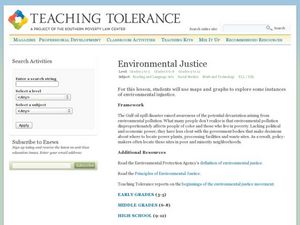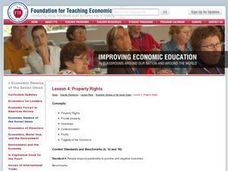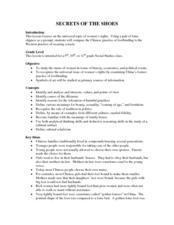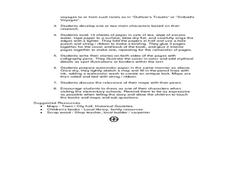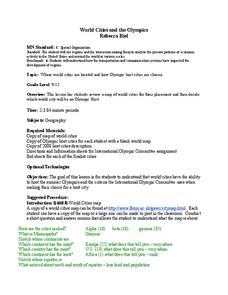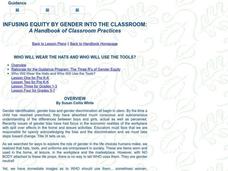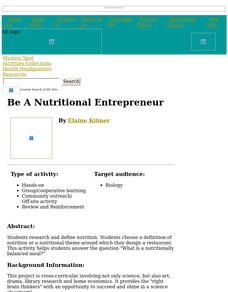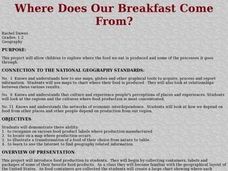Curated OER
Local Governments Don't Do Much ... Or Do They?
Students study and explore their local government. They role play members of their City Council and various constituents as they discuss a variety of subjects typical of a city council meeting.
Curated OER
Environmental Justice
Students explore the concept of environmental stewardship. In this Gulf Oil Spill lesson, students discuss how environmental pollution affects those how live in poverty at a higher rate than those with more affluence. Students read...
Curated OER
Property Rights: Soviet Farms
Students examine the problems with the collectivized agriculture program in the Soviet Union. They listen to a teacher-led lecture, participate in a property rights scenario activity, create a plan for maximizing the value of land, and...
Curated OER
Andrew Jackson vs. The National Bank
Students explore Andrew Jackson's vision for the National Bank. In this Jackson presidency lesson, students determine why Jackson vetoed the National Bank's Charter and indentify the causes of the Panic of 1837.
Curated OER
Thinking About Money
Pupils explore the concept of a personal budget. In this philanthropy instructional activity, students use a Venn diagram to compare 2 stories in which the main characters spend money in different ways.
Curated OER
Heartfelt/Handmade Activities: Genre Painting
Students examine genre painting. They explore the Illinois State Museum website, identify how genre paintings were composed, analyze the activities of an Illinois farm in the 1850s, and create a genre painting of current everyday...
Curated OER
Secrets of the Shoes
Learners compare the Chinese practice of footbinding to the Western practice of wearing corsets to discover universal issues involving women's rights. The lesson emphasizes small group discussions.
Curated OER
The Sexton and the Compass
Learners evaluate how movement patterns create and affect interdependence. They analyze the interactions within and between regions and engage in artistic inquiry, exploration, and discovery in collaboration with others. They design...
Curated OER
Civil War
Fifth graders discuss the causes of the Civil War and write a paragraph summarizing each identified event. In the computer lab, 5th graders create a PowerPoint presentation explaining events leading up to the Civil War. They use the...
Curated OER
Million Dollar Project
Each student is given the task of spending $1 million. The way students spend their money is dependent on a theme such as "creating a dream world," "taking a trip," or "doing something to better society." Each student researches,...
Curated OER
ARE WE IN THE MIDDLE OF A MASS EXTINCTION?
Middle schoolers identify and interpret the following: What is mass extinction, and what are some theories for why it happens? How often do species become extinct? What is the normal rate of extinction? Why are some species...
Curated OER
World Cities and the Olympics
Students examine the various cities in which Olympics have been held. Using a map, they describe the reasons why those cities were chosen and choose their own city for the Olympics and state the reasons why. They examine information...
Curated OER
Science: Finlay and Yellow Fever
Ninth graders research the work of Carlos J. Finlay and his contributions to science. Once they have discussed his theories about diseases, they create tables comparing diseases that use insects as carriers. The lesson also includes a...
Curated OER
Prairie Voices: Spare Time
Students examine forms of recreation throughout the last 150 years. In this leisure time lesson, students investigate leisure activities in pre- and post-industrial society as they listen to a teacher-led lecture and discuss their...
Curated OER
Infusing Equity By Gender Into the Classroom
Students participate in activities to develop life skills related to gender equity. In this gender equity activity, students examine the roles of people using hats. Students will role play various occupations related to the hats....
Curated OER
Election of 1860
Students determine how the presidential election of 1860 led to the American Civil War. In this election of 1860 lesson, students discover details regarding the election and hold their own mock debate and election. Students also write an...
Curated OER
Giants Stalk the High Street
Young scholars explore consumerism in Great Britain. In this current events lesson, students visit selected websites to determine how shopping habits have changed in Britain throughout the years. They also evaluate changes in market...
Curated OER
Be A Nutritional Entrepreneur
Students research and define nutrition. They choose a definition of nutrition or a nutritional theme around which they design a restaurant. This activity helps students answer the question "What is a nutritionally balanced meal?"
Curated OER
Comparison Food Shopping: Buying Groceries for Two People for One Week
Twelfth graders investigate how to develop a simple food budget for two using newpaper ads, the basic four food groups, and calorie counts.
Curated OER
Mesopotamia
Sixth graders find information on three culture universals which they choose for their research. They organize their notes and select illustrations to be used in the final report.
Curated OER
Roll the Union On: the National Labor Relations Act and the Rise of the Congress of Industrial Organizations (CIO)
Pupils examine the many different programs Roosevelt created as a result of the Great Depression. They research the National Labor Relations Act and explore what working conditions were like during that time.
Curated OER
Organizaton of American States Project
Students discover the Organization of American States by researching currents issues in those countries. They create a PowerPoint presentation and share with the class.
Curated OER
Hawaii's Future Tied to History
Students investigate Hawaii's history to help them explain how a Reorganization Act may affect its residents. students track the region's history from statehood, to kingdom, to human settlement.
Curated OER
Where Does Our Breakfast Come From?
Students bring in the cartons and containers of some of their favorite foods. They locate the origin of these foods on a map and visit a farm to view how food is grown and processed by a farmer. Students read books, complete worksheets...



